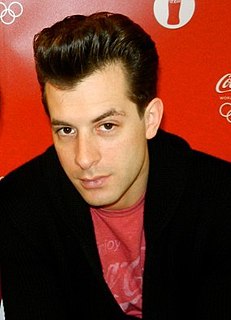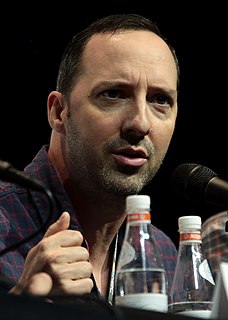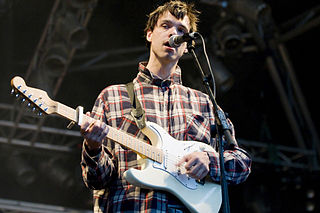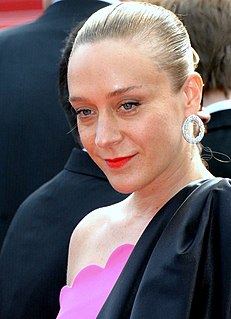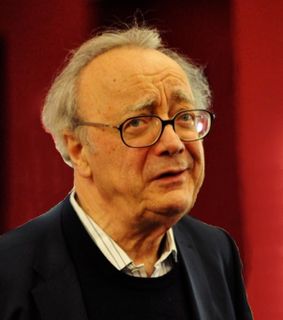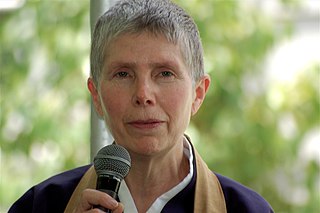Цитата Джонни Гринвуда
Когда я увидел концерт Пендерецкого в Лондоне в 92-м или 93-м, я подумал, что в зале есть колонки. Это были просто струны. Но я мог слышать такое жужжание и урчание, и я подумал: «Откуда все это идет?» И это было просто лучше, на мой слух. Страннее, незнакомее, более волшебно.
Связанные цитаты
Я все меньше и меньше доверяю микрофонам, динамикам и записям и больше не верю в то, что могу воссоздать дома или в наушниках опыт прослушивания живых акустических инструментов. Оркестр — это уже набор динамиков, которые по-разному реагируют на каждого исполнителя, каждое помещение и каждый концерт — это тот высокий уровень неуверенности и неповторимости, который мне нравится. Музыка просто впитывается в стены комнаты прямо из инструментов - и это одноразовая сделка. Альтернатива - левый динамик, правый динамик - своего рода компромисс.
По крайней мере, не в этой стране, — добавила она, немного подумав. «В Китае немного по-другому. Однажды я увидел китайца в Шанхае. Его уши были такими большими, что он мог использовать их как плащ. Когда шел дождь, он просто забирался под уши и был теплым и уютным, насколько это возможно. Не то чтобы ушам было так весело, понимаете. Если была особенно плохая погода, он приглашал друзей и знакомых тоже разбивать лагерь у себя под ушами. Там они сидели, распевая свои печальные песни, пока снаружи лил дождь.
Оркестр Метрополь похож на Каунта Бэйси или Дюка Эллингтона со струнами... это струны, которые качаются. Струны, которые качаются, как Диззи Гиллеспи... продолжай качаться, детка. А когда у вас есть все то особое превосходство оркестра Metropole, ваша музыка просто летит — она парит поистине волшебно.
Просто когда вы слышали хип-хоп, где бы вы ни были, это была культура, которая вызывала у вас желание попробовать стать ее частью. Думали ли вы, что вы артист, думали ли вы, что можете стать ди-джеем, думали ли вы, что умеете танцевать брейк-данс, или думали, что умеете читать рэп. Это была такая культура, в которой было много открытых дверей.
Затем, вы знаете, другая, более традиционная роль продюсера, вроде того, что понимает Куинси Джонс, это своего рода аранжировщик. Итак, ты придумываешь что-то вроде этого - ты слышишь эти песни, которые довольно просты, и ты думаешь, что делает группа? Что делает ритм-секция? Какие там гитары, струнные, пианино и тому подобное. Это почти как небольшой ящик для инструментов.
Как Вуди Аллен на самом деле часто делает это в своих фильмах, это своего рода магический реализм, где у него есть просто повседневные, такие повседневные переживания, и внезапно появляется что-то волшебное или сверхъестественное, и я просто, я люблю это, и я думаю, что каждый может - каждый хочет этого в какой-то момент своей жизни.
В церквях мы видим, что заставить людей прийти на молитвенное собрание гораздо труднее, чем на концерт, служение или что-то еще. Итак, мы подумали, что мы вступаем на какую-то неизвестную территорию, которая может быть такой же прибыльной, или это может быть кассовый провал, но в этом была правильность. И вся эта идея о том, что военная комната похожа на комнату духовной войны, место молитвы, где вы остаетесь наедине с Богом, и вы принимаете свои решения, и сначала вы решаете свои проблемы в молитве.
Полезно просто услышать что-то через уши друзей, людей, которые хорошо вас знают. Думаю, когда я начинал Dirty Projectors, когда мне было лет 20, я всегда представлял себе, что это будет что-то вроде амфибии: что-то, что сможет сопровождать меня, куда бы мне ни пришлось отправиться. Такого рода постоянные изменения были в ДНК с самого начала.
В детстве я очень увлекался искусством. В старших классах я увлекался сюрреалистами и импрессионистами, любил Климта. В 91-м или 92-м я видел рекламный щит Felix Gonzalez-Torres Untitled. Я просто был действительно арестован этим. Это был своего рода мой первый набег на современное искусство. Это был поворотный момент для меня в отношении того, каким может быть искусство, что оно означает и какое влияние оно может оказать.
Мы были настолько единым целым, что я не думал, Что мы можем умереть порознь. Я и не думал, Что могу двигаться, а ты застыл и застыл! Что я могу говорить, а ты волей-неволей немой! Я думаю, наши сердечные струны были, как основа и уток, В какой-то прочной ткани, сотканной туда и обратно; Твои золотые нити в прекрасном узоре На моих более тусклых волокнах.
Я возвращаюсь к тому, что вы сказали о видении, слушании и слушании. Я должен был подумать о замечании, которое я услышал вчера, кто-то пришел и сказал: «Я видел ваш концерт». Можем ли мы изменить использование этой фразы, пожалуйста? И я надеюсь, что некоторые люди на нашем сегодняшнем концерте будут слушать и даже слышать то, что мы делаем!
Несколько раз в день останавливайтесь и просто слушайте. Откройте свой слух на 360 градусов, как если бы ваши уши были гигантскими радарными тарелками. Прислушивайтесь к очевидным звукам и тонким звукам — в своем теле, в комнате, в здании и снаружи. Слушайте так, как будто вы только что приземлились с чужой планеты и не знаете, что издает эти звуки. Посмотрите, слышите ли вы все звуки, поскольку музыка играет только для вас. Даже в том, что называется тишиной, есть звук. Чтобы услышать такой тонкий звук, ум должен быть очень спокоен.
Я чувствую себя более дома в Лондоне, чем в Лос-Анджелесе, определенно. Если бы у меня был выбор, я бы, конечно, жил в Лондоне, а не в Лос-Анджелесе. Я просто предпочитаю это здесь. Но я люблю эту работу, а в Лос-Анджелесе ее гораздо больше, и как актеру приходится идти туда, где есть работа. К счастью, я смог получить работу там. Если работа вернет меня сюда, и у меня есть проект, и я могу его реализовать, я воспользуюсь этим шансом.





